Moog, Korg and Behringer: What is your synth worth?
Two products, both labelled with the legendary number 2600: One costs €3999, the other €599. What does value mean for synthesizer fans in 2020? Are premium synth brands justified in charging customers top prices? Or is the creativity of legendary designers and manufacturers being copied and dumped on the market at lowest prices? Just who is ripping off who? What’s your synth worth? Time to explore some thorny issues for the synth community.
Synthesizer pricing in the age of Behringer
I can understand new technology replacing old technology, there’s a sense of evolution in that. Our phones get slimmer and more powerful and our cars get more efficient and reliable. But when hardware comes up against the same hardware we find ourselves asking different questions. Questions about the value of a brand, the value of legacy, of authenticity and to some degree morality. On one hand, does a company have a right to harvest the ideas of the past and sell them at knock-down prices that undervalue the very reputation they are selling on? On the other does a company have the right to ask for a price based on what they think people will pay?
We’re in a Golden Age of Synthesizers
At the moment the world of synthesizers is in a golden age of renewal. The interest and availability of amazing electronic music-making machines is at an all-time high. There’s everything from big companies making big synthesizers to a cottage industry of makers producing Eurorack modules out of their kitchens. Big names like Moog and Sequential see themselves as boutique brands with exquisite products offering a lifestyle of synthesis where the price is secondary to the art and craft of sound and electronics. Companies like Korg and Roland see themselves as offering similar tools at more reasonable price points through automation, efficiency and scale.
We understood that relationship. Moog made the synths we couldn’t afford, Roland almost but never managed to make the thing you always wanted and Korg filled in the gaps with decent bits of quite exciting gear. Then into the mix comes Behringer with a mission to flood the world with cut-price replicas of all the synths you ever wanted.
There have been a few moments that really made me think about this. The first one was the re-release of the Minimoog Model D in 2016 for £3249. You could actually own a classic Moog synthesizer for the price of a second-hand car. A year later Behringer released their Model D clone for $299. Now I could have the authentic sound of the Model D in a hardware analogue synthesizer for the price of a digital groove box. It’s a tenth of the price and according to the people who know it sounds pretty much the damn same.
But there are two very recent moments that prompted this explorative article: Behringer’s announcement that their ARP 2600 clone will be €599, and the release of the Sequential Prophet-5 (Rev4) for €3,555.
Earlier in the year Korg produced a reissue of the legendary ARP 2600 synthesizer which could be yours for €3,999 if you were one of the lucky people to get in quick enough to bag one of the 500 that were initially produced. We all went nuts at the fabulous authenticity and wished we could afford it. It’s never going to be ours; it’s an aspirational synthesizer that gives us a sense that there’s a higher level to aim for. Along comes Behringer’s clone of the very same synthesizer and it can be yours for €599 and there will be plenty to go around.
Moog or Boog?
How do we reconcile these things? How do we contribute value to the Korg ARP 2600 at nearly 7 times the value of the Behringer? The Moog Model D is 10 times the price of the Boog. The hardware is different, for sure. It may be based on the same circuits and sharing all the same components but with Behringer they are surface-mount versions and miniaturised circuits which, to the gods of analogue sound, mean that their electrons have not gone through the same pathways as the electrons in the real thing. However, differences in hardware can only make up for a proportion of the price difference.
So are Moog and Korg pricing things based on costs of materials or on what they think people will pay? Sequential recently released the Prophet 5 (and 10) Rev4. It’s a beautiful thing, an ultimate synthesizer from a vintage age of awesome electronic sound. Arturia had recently announced the PolyBrute polysynth and it was priced around £2k which felt like the right sort of price for an awesome polysynth. The UDO Super-6 was similarly priced and in fact, Sequential’s own Prophet-6 and OB-6 were in the same ballpark. So when the price of the Prophet-5 arrived at over 3 grand and the Prophet-10 at 4 grand it felt just a little bit inflated.
Of course people who have that sort of cash to spend on synths will lap them up. As a business model for Sequential it completely works. By keeping the prices high, Sequential are able to build a premium product with high-end and uncompromising components. But it also stamps it as an aspirational product, something that professionals use and us mere mortals can only look at longingly from our screens. Is it really worth as much as the ticket?
Behringer has stated that it builds pricing upon how much a device costs to make plus a little bit for profit. If that results in a €599 price on the 2600 then what exactly is the component price of the Korg ARP 2600 and how much is what they think people will pay? You could say that Behringer is saving on R&D because they’re not developing their own products although it takes a fair bit of time and effort to analyse old synths and build comparable sounding circuits. But then what about Korg? How much R&D did they put into resurrecting a decades-old synthesizer that they had the original engineers working on?
Another point Behringer makes is that it doesn’t spend any money on marketing and advertising. Their social media team might make a couple of fruity demo videos whereas Moog will produce long-form, cinematic films with professional producers and musicians, glossy catalogues and double-page magazine adverts. It also makes you wonder where else Behringer are making their savings. Do they perhaps keep their costs low by leveraging low-wage production economics? Is there an ethical element involved in synthesizer production or is everything actually made in China and it’s only the last few screws that are put in by a well-paid worker in San Francisco or Asheville? How important is that when we make a purchasing decision?
Does it matter?
I would be the last person to suggest that this somehow makes Behringer the only honest company in the game. There are many factors involved in creating an electronic instrument. And that’s a factor right there – I’m not sure that Behringer sees its synths as instruments in the same way other companies do. It doesn’t appear to put a lot of thought into the layout or ergonomics or design of its devices. The driving force is to provide fabulous sounds at the cheapest price possible. Other manufacturers perhaps put a lot of time and effort into developing interfaces, testing the feel and crafting an instrument and it’s that which inflates the value of their products – and probably quite rightly.
It’s an argument that will continue and it’s a fascinating time to be interested in synthesizers. I know that there are beautiful synthesizers out there that I aspire to own. But I also know that realistically I could be playing on something, that sounds to my ears identical, right now for a fraction of the cost. Both those feelings, those concepts can sit perfectly fine in my head without contradiction. What a time to be alive.
71 responses to “Moog, Korg and Behringer: What is your synth worth?”

 4,1 / 5,0 |
4,1 / 5,0 | 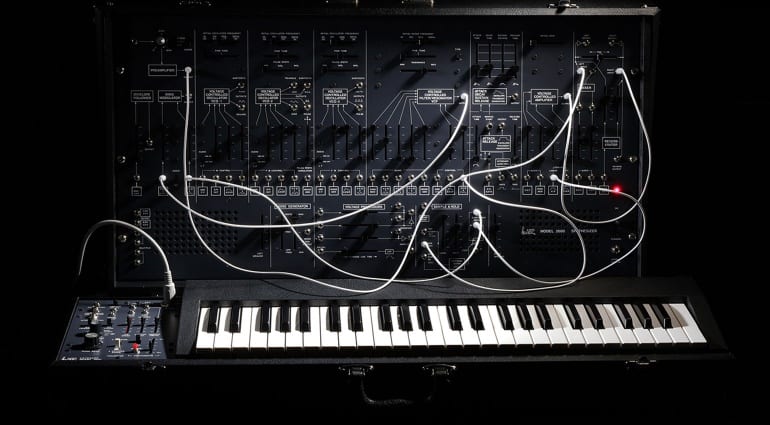
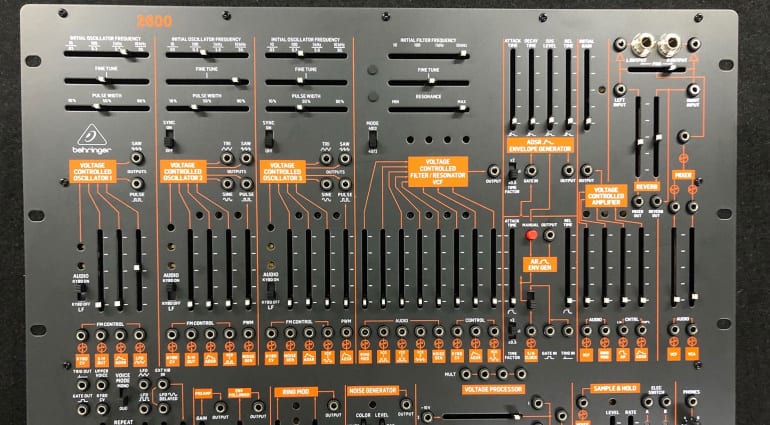
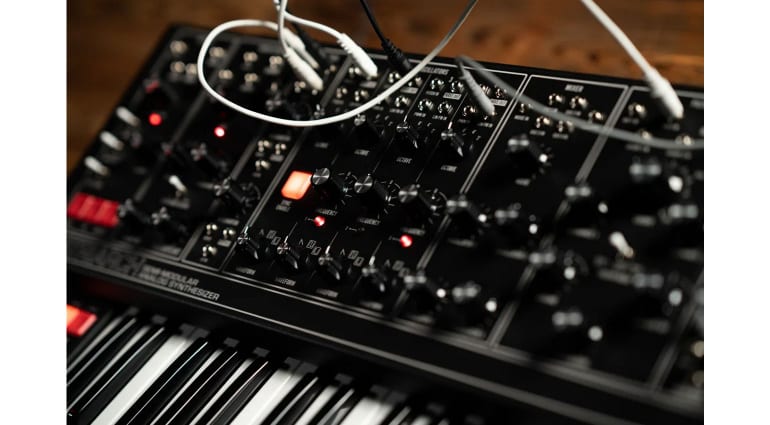
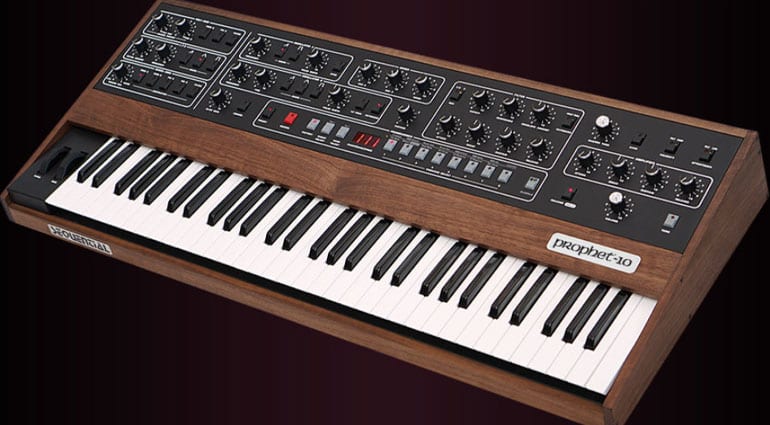
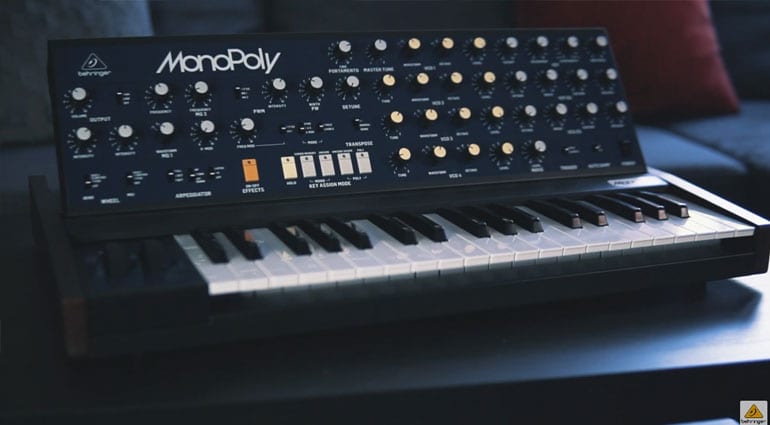
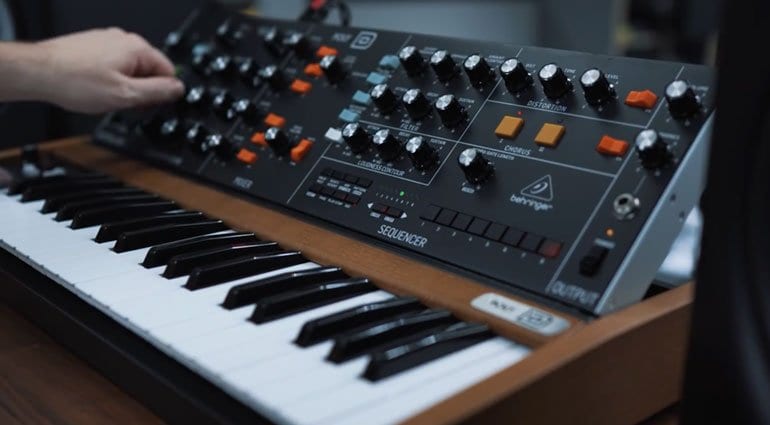






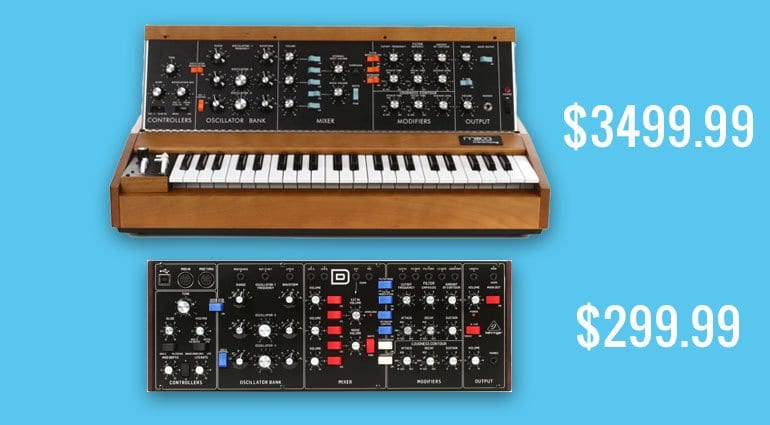
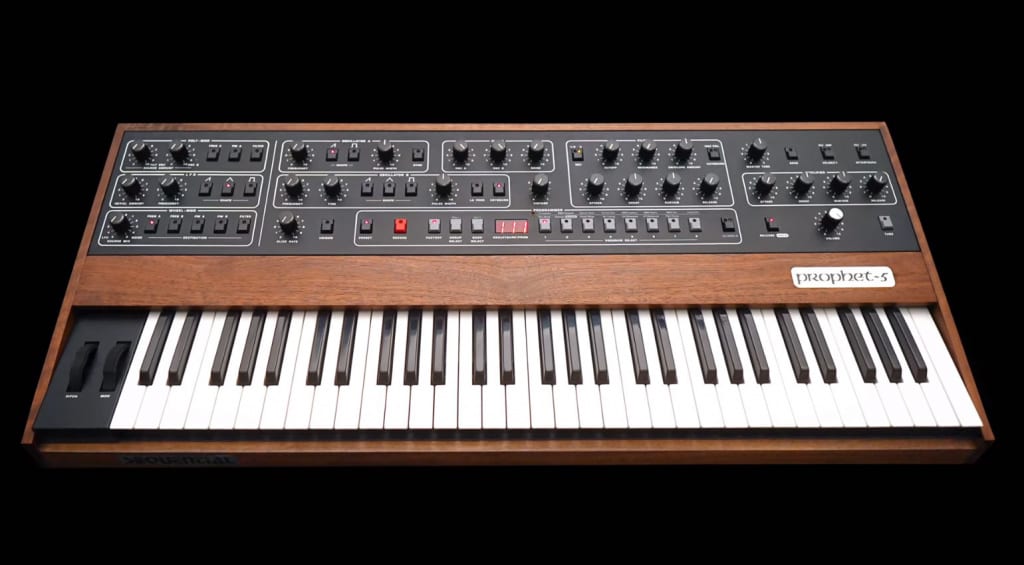
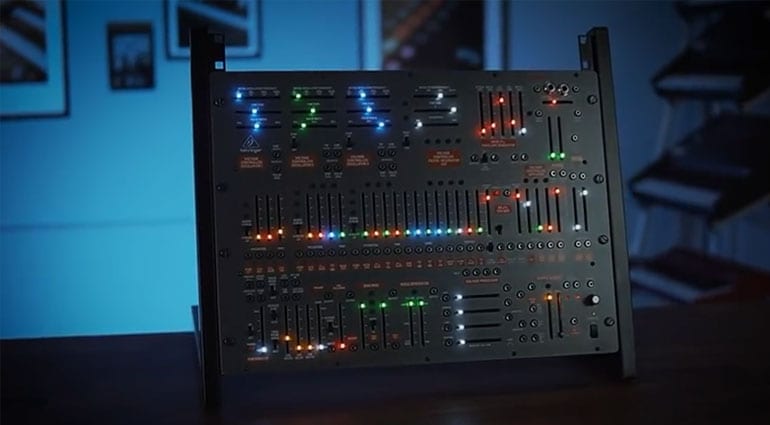
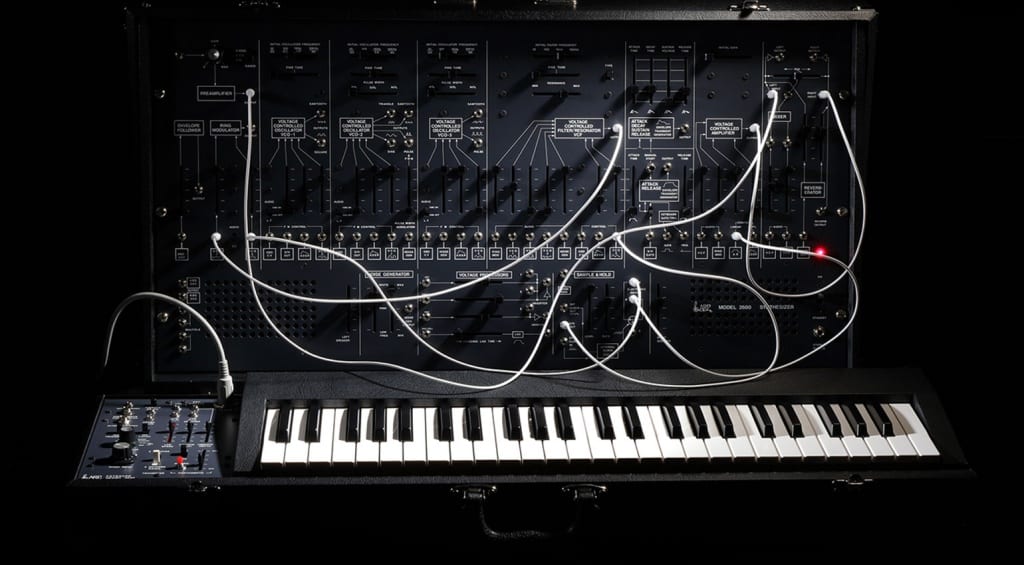
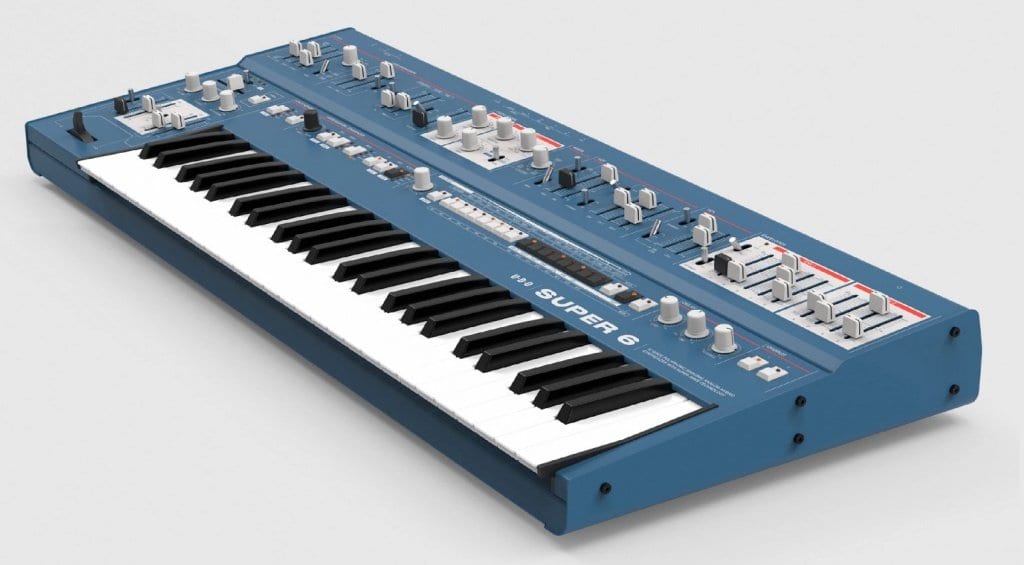
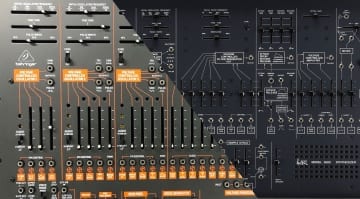

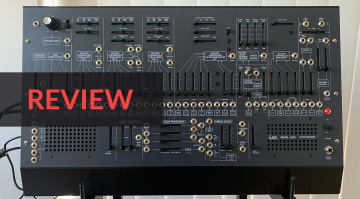

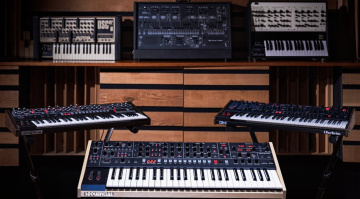
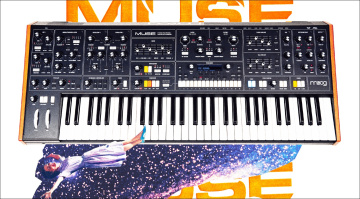
I want the expensive ones (but wil probably get Behringer Poly D).
Btw, this site should have more comments. I like it!
It’s all about variety. I use Moog for Bass, Sequential for Arps and Oberheim for pads. However, I think my Behringer VC340 is really great in terms of sound. Each of my synths has its advantages and disadvantages.
Unfortunately, I had to try a lot out and wasted a lot of money to find my dream setup. So … yeah … it was worth it.
As far as I know, Behringer is also the main synth component supplier for almost all synth manufacturers. The Curtis chips and similar other circuits used in analog synths today all come from Behringer.
Not disputing this, but I’d love to know the source. I read about the Prophet 5 rev4 using the next follow-on filter chip because the designer/manufacturer was still doing work nearby, so at least for that famous filter, Sequential is NOT using a Behringer chip. Before I buy into one way or the other, I’d just like to know where is the data sayng all these manufacturers are using Behringer’s chips (and if so, perhaps Behringer is marking the chips up a lot).
fortunately, sequential does not use any components in the current p5v4 from behringer, otherwise it would have been said that it was behringer’s fault. probably the first synth where you have to unsolder components.
It is also not known where the loose screws come from.
had rarely seen such a bad product for 4k, it’s just not high quality china.
Incidentally, the p6 has cool audio inside
Cool Audio a Behringer owed company produces the Curtis chips, they have been used by Korg and Sequential Circuits. Do your research.
Completely untrue.
I’m fairly confident that Moog is not using Behringer-produced oscillators or filters.
Plenty of Eurorack makers probably hopped on those cheap Behringer 3340 clones, but the company that was once Curtis, the original creator of that chip, actually started producing their own official reissue of that chip as well. And Erica Synths was producing a 3320 clone
Wrong. CEM chips are manufactured by OnChip Systems, the company founded by Doug Curtis. Behringer chips are copies.
There are at least 3 Manufacturers making clones of the “Curtis” chips
I should have followed up the discussion. I had read in several sources in the past (I cannot really remember which ones, sorry) that Behringer’s companies do provide a lot of analog chips to many synth manufacturers. If others here know better, I stand happily corrected.
Man kann nicht genug Synthesizer haben
OMG. It’s 2020 already. Just get a decent computer and shove it with some plugins.
If not satisfied, buy the cheapest ones you can get away with.
VST’s will never replace hardware. Asking a computer to do everything is like never shopping or going anywhere except Walmart.
Loser.
I’ve actually avoided buying any clones of old designs instead buying a few old synths instead (which had no clones made…).
I do currently plan to get a Prophet5 rev4 in a year or so. (I’ll need to save up.)
While I doubt there is as much R&D, even Korg having the original ARP schematics has some reverse engineering to do. And as we know they did do some upgrades. I don’t class Behringer as evil for how they approach it, but as I have been seeing what they have been bringing out, I don’t find their synths as appealing. I am more interested in some of the small boutique producers (Analogue Solutions, Rare Waves, Plankton Electronics, Dreadbox) that have shown a lot of originality.
This is exactly how I feel. I appreciate that Behringer is making legacy gear available to a new generation for cheap. But having acquired several of their synth offerings, I realize that you get what you pay for. It is cheap, and just because it’s possible to get the same sound out of it, there are wider gaps of meh between the sweet spots, and the machines just generally are not as inspiring to use and feel cheap in the hands. An synth is an instrument, and as such is more than just the sum if its circuits. It’s not just about good things that it has, it’s also what bad things it doesn’t have, and whether it guides you to producing the music you want to hear.
Yea, I have had a lot of Behringer gear…..90% of it is just “ok” 5% is trash, and 5% is good/great.
I agree with this too. A lot of Behringer’s clones sound great to my ear but going beyond basic sound they are functional at best. The lack of midi CC is a particular gripe. I’d like to see Behringer take it a little further, innovate a bit and start to develop on the original concepts. I also think their scattergun approach and sheer number of products released is counterproductive – they are oversaturating the market, evident in the volume of their synths available on the second hand market. It’s a fantastic time to be into synths and I applaud Behringer for opening the market to those with less means but i’d just like to see them develop their strategy and offer a little more than a series of stripped back 40 year old synths.
I don’t really have that big of an issue with Moog, Korg, Sequential, et all, pricing things the way they do, nor do I with Behringer. What pisses me off is the secondary market. I had secured a pre-order of the Korg Arp 2600 and then covid-19 hit, and shipment was delayed for so long, that the music store I had my pre-order through went out of business in the interim. Korg did not honor my pre-order, and now I feel the pain of insult to injury every time I see people listing their used 2600s for 8000 plus dollars. I’m thankful that a company like Behringer exists to fill in the gap for those of us that want the experience, but cannot afford the price of admission. I will get one of their 2600s at that price, but I would also grab a Korg if they ever decide to make more, and I can get in for the original price, and not the price gouging price, that synth flippers command.
There are a couple of rumors you should be aware of…
1) Seeing the crazy demand of the Korg ARP FS, there is a rumor that Korg is considering the release of another batch.
2) Korg was supposed to release the Korg 2600 mini this fall. Covid may have pushed that to 2021, but there was a prototype built (which people at Namm 2020 viewed) and pictures were leaked: https://futuremusic.com/news/images/Korg-ARP-2600-MINI-FutureMusic.jpg
“Behringer has stated that it builds pricing upon how much a device costs to make plus a little bit for profit. ” That’s how all of the companies work. Maybe you should talk to some of those other companies? Really, dude, be a journalist. You sound like you work PR for Uli.
Week put.
Well put.
No most companies add at least 50% on cost depending on the product. Products with prestige often have way higher mark ups. Of course companies like moog have higher costs per synth as well (promotion, well paid workers that co own, new product design etc.). Behringer is cost based, using scale and mass industry to lower costs, have a lower profit margin which the sheer amount of sales compensates for. Smaller companies are based on demand for a limited supplied product. The harder it is to get a product, the stronger the need to have it. And than you can ask more for it. I don’t mind with smaller companies cause they are also a lot more vulnerable than a massive and diverse company as behringer
That’s not at all how all companies work. Many companies have a really high margin on their products and not “plus a little bit for profit. “.
Especially Korg and Roland.
Hi Robin. Very good article. A few comments, if I may:
* I believe a significant portion of Behringer’s cost savings comes from vertical integration — they manufacture many of the component parts themselves instead of having to buy them from a supplier. I believe Moog has their CCAs built to print by a supplier that then ships them to Asheville for assembly.
* Not being willing to buy a synth that costs a fraction as much as the premium choice and sound identical is probably illogical, but no more so than my and many others’ preference for pure analog over digital emulations.
* Some people do indeed think SMT is inferior to full size components but I’m not aware of any difference in the actual physics that affects the electrons. A capacitor is still a capacitor, regardless of size
* I’m not convinced we’ve seen the end-state of Behringer’s mission. Not many years ago they weren’t considered a synth company at all. Now they’re producing a mostly clones of mono-synths, but we know they’ve got more poly-synths in the works having just announced that their UB-Xa model is built on a custom OS that will be reused for future polys. All those teams studying and copying classic circuits are building a wealth of expertise. And don’t forget that they like to remind us all that Uli B built his own synth in his youth. I have a hunch he wants his name to ultimately be associated with new designs and what we’ve seen so far is him building a path to get there. (And I could be completely wrong)
“illogical” sure but we don’t make many decisions based purely on cost – there are so many factors.
Let’s just be happy and celebrate all their efforts. I am glad the remakes are being brought back at any price. There will always be boards I can’t afford recalling the kurzweil k250 & emulator back in the day. If/when Roland and Behringer bring back the JP-8, I would want to own both to keep the Roland at home.
The electronic musical instrument manufacturing companies desperately needed competition and I’m glad Behringer came along. I have most of the Behringer analogs and drum machines, and they are fantastic sounding even aside from the price. I’ve also been the owner of an original P5, Obxa, Sequential P6 and DSI mono evolver. The value of these synths is way overstated and driven by a strong dose of of nostalgia. Dave Smith is taking advantage of this. The quality argument is nonsense, I had issues with both the P6 and Evolver. And he’s now released 300 faulty P5 / P10’s that need modifying or replacing. My Behringer gear has worked perfectly so far for 18months everyday. I think Behringer are doing a brilliant job in flattening a overpriced playing field.
I like the choice we have in the synth world from smaller boutique builders with varying prices to larger synth builders building on the legacy of their name at a more premium price
If one company can replicate and build a similar design and sound of yesteryear at an affordable price you can’t help but notice!
The Korg 2600 is imo just a Behringer 2600 in a 3500€ flightcase. They both use smd components on a single pcb for the lowest price possible. Korg just adds an overkill case to justify their price tag because it’s closer to the feel of the legacy. Because the touchy stuff and the legacy won’t add to the sound that is coming out of those machines, I rather save a ridiculous amount of money and go for the Behringer
“ But I also know that realistically I could be playing on something, that sounds to my ears identical, right now for a fraction of the cost.” Identical…?Anyone who says that should not write his/hers opinions about sound and synthesizers for everyone to giggle at. It’s that simple.
Grab 10 ordinary people off the street (you know the ones who actually buy the music that is made with these synths) and ask if they can tell the difference.
Korg have made over 500 units by far now ,and still producing (having sr/n 1103 myself) so they are not so totally out of reach if you have the money…….
Oh, well that’s great. I understood the initial run to be 500 and have not seen them in stock since, but I’m glad it’s still in production.
Yep 500 was the rumour …. no one knows where that came from.Guess Korg maybe “hinted it” from the beginning to keep up the interest and price.Never trusted Korg and their limited editions MS kit,Odyssey FS and now MS 20 again and ARP 2600 never telling us straight out how many will be made!
There is one simple explanation for such a difference in price.
On one hand you have a company that remakes a known design, but using modern pcb and surface mount components. Having a pcb made is 2$ for 10 pieces nowadays, for every you and me. And prototyping a board with around 50 components can be as low as 300$ for 10 pieces. Every part of the process is automated, SMD components are mounted with pick and place machine.
On the other hand, you have companies that use traditionnal through hole components, that can only be placed by hand. Make it assembled in the US and you already have dozens of hour of work.
Add the cost of searching and sourcing old stock of components, the time spent testing them, at leat for model D.
Add a hand made wooden cabinet.
You can find pretty goods guitar for a few hundred dollars, but you won’t ask a guitar crafter to make one at this price.
Is the game of using traditional through holes components instead of modern SMD worth it for synths, the question my be posed. I’m not sure of it.
I’m not sure that’s true. They all use SMT components these days for a large part, made in the same sort of factories with only the assembly done in the US. The two capacitors that are causing a lack of high-end signal in the new Prophet-5 are surface-mounted. So while there are differences in scale with the manufacturing it can’t really account for all the difference in cost.
Behringer have done the same with guitar pedales. Their units are made produced in China to keep the cost down and they are generally made of plastic so they’re not as robust as some of the bigger brands like Boss, but at least they give amateur guitarists the opportunity to experiment with different effects pedals. I have no guilt about buying their stuff.
This article would be so much more valuable and interesting if you had any actual data on what these companies are spending on R&D and manufacturing beyond hollow statements like “Behringer has stated that it builds pricing upon how much a device costs to make plus a little bit for profit.” You paint it here like Moog and Sequential have high prices on a whim, and not as a reflection of their costs.
And that’s to say nothing of Behringer’s extremely aggressive and bullying tactics as a company in the industry.
No I have no idea, I’m simply posing some questions and considering the implications, this isn’t investigative it’s explorative 😀
Regarding Behringer, when you say “Do they perhaps keep their costs low by leveraging low-wage production economics? “. Surely this also applies to the Novation Summit (2100euros) and preumably the Arturia polybrute (2500euros?)… how much profit are they making?
yes, quite possibly
Everything made in China leverages low wage economics… still highly automated, as well as factories in the US. Assembly line jobs are some of the lowest paying jobs out there…
did you guys really delete my earlier comment? That’s more hilarious than it is frustrating
Just slow in approving them
I’m glad that Behringer have joined the synth manufacturing market.
Since joining they’ve become Europes number one synth manufacture and that speaks for itself.
Having choice’s like Behringer, Sequential, Moog, Korg and Roland is a good thing. Imagine if the only car’s available were Bugatti’s, Tesla Roadster’s and Porsche, very few of us would own a car. So I’m glad that there’re Ford’s, GM’s etc.
You forgot to mention the price of a vintage original ARP 2600 😀
Company ownership is another important factor. Many of the old brandnames in the music industry are no longer the independent businesses from the past, but taken over by investment companies where a CFO with a MBA degree often has a stronger position than a R&D or Marketing manager. At Behringer you at least have an owner who is as much a technology nerd as a musician himself. He and his staff don’t give a damn what the industry thinks of them. They don’t do marketing in the traditional way and don’t send out free gear to music magazines to be reviewed. Why would they? They’re smart enough to inform potential buyers long before a product hits the market. All people who already know what they can expect from Behringer and are prepared to hold on to their money until that Behringer product hits the stores. Buyers who became ambassadors and generate free publicity through YouTube videos and social media shoutouts. Because of that, Behringer doesn’t need to involve themselves in the magazine ratrace where selling ads is more important than the editorial content.
Behringer is also smarter beyond the marketing. The Midas staff have been extremely valuable in (re-) designing the synts, but recently Behringer also became a safe haven for knowledgeable senior synth designers with decades of experience who are enabled to do what they do best. Behringer became Musictribe and it bought or built brands that are essential for their business. CoolAudio, Midas, Klarkteknik, TC Electronics, etc. have such a scale they’re hard to beat.
Nobody is held at gunpoint to buy their gear, but why the haters (endusers and industry ‘experts’ included) insist the products are bad because they use heavily automated production and SMT parts instead of through hole, handsoldered components is beyond comprehension. That’s like saying handmade parts on a lathe or milling machine are more accurate and consistent than producing a CAD design on CNC machines. Of all the gear I’ve bought the last few years only my Behringer synths haven’t let me down. That’s enough for me and makes me hold on to my money until that SEM clone is released….
Behringer has a bee in their bonnet about magazines and website reviews. I also write for Sound On Sound magazine and I can tell you that most manufacturers don’t send out free stuff either – it’s usually on loan for the purposes of review. Most companies find that the professionalism of a publication like SOS is useful because it will be a fair, balanced and trustworthy review. None of the reviewers are the least bit concerned whether the company in question has purchased advertising space and they don’t get to keep the gear – they get paid by SOS to write the review. Behringer has it all wrong. SOS has reviewed some of their gear because a reviewer has bought it themselves – but the only reason they don’t get more coverage is because they refuse to loan them any gear – there’s no snobbery involved although you can understand why people in the industry might have a low opinion of them.
The fact is Behringer presents a decent product for the price. Even better they put the time in to get the basic bones right for DIY upgraders that can spot the cost reductions and reverse them to enable greater inate functionality. 🙂 Thank you Uli! You’re serving more user groups than you might know.
“Along comes Behringer’s clone of the very same synthesizer and it can be yours for €599 and there will be plenty to go around.”
LOL. What on earth are you smoking? In NO way are they the same. Did Behringer write this?
I didn’t say the Korg 2600 and Behringer 2600 were the same, I said they were clones of the same synthesizer – yeah?
“I didn’t say the Korg 2600 and Behringer 2600 were the same, I said they were clones of the same synthesizer.” – That’s exactly correct. Vincent stated that Behringer product will (or should) be readily available.
So many haters…so little time.
When the main question was one of price I gave Behringer the benefit of the doubt and bought the yellow TD-3.
Soon after we got a glimpse of their wider business practices, in how they’d try to elbow their way around boutique manufacturors (DevilFish) and intimidate independent bloggers (Peter Kirn).
For me the sum of these practices tips the scale: offering these products at these prices requires unethical business.
I am Behringer’s audience: short on budget with a serious case of GAS. I now only buy DIY kits. Thing is, I love the stuff I built myself so much that I hardly ever use my TD-3, while having an authentic sounding Acid machine used to be a dream…
THIS! Totally agree, I do the same with guitar pedals, DIY the stuff I crave… my philosophy is, I can’t buy more than I can make, and once you stockpile a lot of components, you can make boutique pedals REAL cheap.
Also looking into building outboard and synths (the SEMblance -a souped up Oberheim SEM-eurorack clone and the Guinguin minimoog). Until then, if I want to make music, I use what I got. The Afrorack guy knows what I’m talking about.
Best of all, it stops me from getting tempted to support a company that sues individual forum members for criticizing them, uses the marketing money that this article states they use very little of (apparently they do) to target a single music journalist doing what a journalist should do which is be critical (…and the list continues: https://en.wikipedia.org/wiki/Behringer#Developments)
How many people in this world do have the luxury of selecting the stuff they buy based on ethics ?
I am not one of them.
When it’s a synthesizer for what is for the most of us, let’s face it, a hobby, the synthesizer itself IS the luxury. It is not essential for your everyday life – it’s not even essential for music making. At best, it can be a tool that inspires more music making, but that fact alone should reveal it as a luxury.
But no, no one forces us to buy ethically, even in your daily groceries – whether or not you buy organic food etc. So I completely respect that if your income is low you’d find places where you can save money, but I don’t think that argument is as valid withs synthesizers as with essential daily life items like food and clothing. You don’t NEED that synth.
I personally boycot Behringer because of their unethical practices. (for the interested, read here: https://en.wikipedia.org/wiki/Behringer#Developments) For many reason, one being that I identify with the products – I think most people do when they get inspired to use them in their music.
It saves me a lot of gas – cause JEEZ I’d love that Oberheim UB-XA. But then I open the Sonic Projects OP-X and I CAN get the same sounds – less inspiring experience, definitely, but it gets me to the end goal which for at least is to make music.
You don’t need a hammer to drive nails, you can use a rock…
I just think it’s sad… all this attention on vintage synths, and almost none on the technique and musicianship that the original players of those synths had. Without the synth greats of the 70’s and 80’s, no one would give a damn about a Minimoog or an ARP2600. They would be meaningless hunks of circuitry.
The ‘fashion’ is nothing without the substance. And that’s sadly lacking, these days…
I do not support your idea that Behringer is the most honest company. They very often state that you can own the historical product at a lower price. But that is ofcourse not true: you only own a new replica. Also soundwise they are not always spot-on. The second lie is that they are the only one to price them at cost plus a surcharge. Their pricing mechanism is not different from every other commercial product on the market. They simply use price elasticity: you sell more units when you have a lower price. And they reduce their base price by automation, not outsourcing production, use community building as marketing tool and spend nothing on strategic product development. And to me this is all fine. If there is a market take it. But if you believe that they are more honest and that they make less money then their competitors you have clearly fallen for their marketing strategy. The only concern I have is that they collected so much engineering talent that work on the products of the past while those people could and maybe should be working on the products of the future.
Thanks for the comments. I specifically said that I don’t believe Behringer to be the most honest company.
totally agree with this – all this talent cloning 40 year old technology. it’s even influencing people like dave smith to look backwards and reissue. imagine what they could achieve if they innovated and pushed the market forward whilst maintaining their low price strategy.
I Love it when people think they’re taking the higher ground by buying the “real thing“. Do it, if that makes you feel better. But just try the behringer remakes and tell me they aren’t dope synths.
Im a synth tech and also work in the Eurorack market as of the past 6 years.. I have ordered 1000’s of components to build synths and also to repair them.
Honestly.. Dave Smiths new prophet 5 costs under a grand to make.. The rest is stuck in his pockets…. Behringer are of course making synths to turn a profit.. Don’t let that side of the stoy fall short. Uli is a business man.. and business men make money… So the fact that he can make a moog for 300 quid and make money on that really tells you everything you need to know about how outrageously overpriced music equipment is.. I can say that Eurorack stuff turns the least profit and genuinely is expensive to make as 80% of the modules are built by nobodys at home.. The have to buy stuff in small quantity’s and often times hand assemble the modules.. That eats into there returns and dictates why they are expensive as a whole.. The bigger company’s like make noise ect.. have most of there products flow soldered straight from a machine in china… So there not building them.. They might be assembling the faceplates to the boards, but a this stage id even say that’s minimal.. They obviously make the biggest profit on there modules.. But its still nowhere near the levels of Dsi..Moog and Roland..
I like the move Behringer are making.. It will hopefully knock the prices back on future products out of the industry… Fair and competetive I say…. I genuinely hate Moog the most.. sorry it has to be said… They are con artists…. I would never buy one of there products… To me there are the absolute worst at overpricing and hyping there synths… They rub me up the wong way, ever since Bob Passed….
A Behringer synth is a cheap copy and always will be, as long as you understand that and don’t have any issues with their business practices then buy them if you want to, don’t think you are getting more than you paid for though or you will be dissapointed.
I have both, older collectible synths, and newer Behringer synths. I see both sides of the argument. I, of course, want my collectibles to continue to hold value. Cost and quality mean a whole lot to me also. My money has to go to more than just synthesizers. Quality seems to be a big argument against Behringer, but it’s an unfounded one, these days. I have some Moog stuff, it’s built crappy. I have some Sequential Circuits stuff. It too, built crappy. These are just examples, not all inclusive. my statements don’t reflect my love for the equipment, or their creators. All of my Behringer synths, are way more solid than other brands. In today’s world, the need to charge that much is based on greed. The old days are over. No need for the “my shit don’t stink companies” if all they are out to do is gouge every working person. We all have governments that do that just fine. I would also like to add a mention of Roland. They have had more than enough opportunity to reproduce items the consumers want. They just keep producing over-priced, cheesy digital versions over and over instead. How can any of these companies complain about what Behringer is doing? The opportunities were there, and Behringer answered. Most of the people that are upset, are the collectors. They are worried that they can’t corner some poor soul into giving up everything they have, just to pay an inflated price for an item that should be played. Sure I’ve upset a few people, not my intention. As an owner of both old and new, and a collector, I feel I have an objective opinion not based on greed.
Thanks for the comments – I don’t think you’re upsetting anybody 🙂
There are absolute differences in quality but, frankly, not enough to justify the price differences. The ‘premium’ manufacturers charge what they think the market will stand. This is not any kind of ‘sour grapes’ reaction to ‘overpriced’ synths, it’s simply how the majority of pricing decisions in every consumer product are made. It’s why ‘designer’ fashion costs more and, to come down to grass roots level, why Greggs pasties cost more in some locations than others 🙂 As long as people pay for ‘overpriced’ gear, it will remain ‘overpriced’ 🙂
You are currently viewing a placeholder content from Facebook. To access the actual content, click the button below. Please note that doing so will share data with third-party providers.
More InformationYou are currently viewing a placeholder content from Instagram. To access the actual content, click the button below. Please note that doing so will share data with third-party providers.
More InformationYou are currently viewing a placeholder content from X. To access the actual content, click the button below. Please note that doing so will share data with third-party providers.
More Information